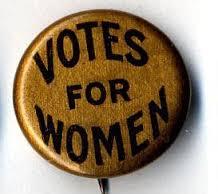
Women have been able to cast their vote and voice their opinion in elections for nearly a century; it took almost that long to make this right a reality. Activists and reformers fought for women’s suffrage for nearly 100 years, overcoming many pitfalls and disagreements that threatened to destroy the movement. The 19th Amendment to the Constitution was finally ratified on August 26, 1920, enfranchising all American women and recognizing that they, being created equal, should be given a fair say in the bodies that design and support the framework of our society, and our nation’s place in the world.
It is no surprise that major reform takes time. Social change seems to be happening faster than ever before, but we still have work to do to demolish the disproportionate barriers women face in our state and in this country. From unequal pay to sexual violence, from hurdles for necessary healthcare to the burdens of heading a household without workplace protections, the battle for gender equality is not over. Women of color, immigrant women, older women, and LGBTQ women face additional barriers. While the 19th amendment was an initial step at granting women equal rights and responsibilities of citizenship, we need a more diverse electorate that includes more female representation to ensure that the interests of all citizens are fairly addressed.
Despite encompassing more than half of the US population, women continue to represent less than a quarter of state and national legislative seats. A study by Pew Research Center ranked the United States 33rd out of 49“high income” countries for number of women in the national legislature. Even in Rhode Island, where our government has unprecedented women’s leadership in the Governor, Secretary of State, and Senate President, just 30 of 113 members of our General Assembly are women. Studies suggest that a possible reason more women don’t envision themselves as elected officials is that they don’t see women whose lives they relate to in those roles. Also, many women are unfamiliar with of the mechanics of policy, and, thus, are apprehensive to take a more active role. Women’s issues are everyone’s issues, but there are challenges and inequities that men are often blind to. Women must participate equally with men to have their perspective effectively incorporated at all levels of decision-making – private, public, local and global.
The Women’s Fund of Rhode Island is working to engage more women in our public sphere by creating an environment in which women can learn and gain hands-on experience while working within a supportive network of diverse, but like-minded, female colleagues. Since 2008, we have been offering a Women’s Policy Institute to develop and encourage women to engage with our government. This program covers a wide array of essential skills for effective policy involvement, including communications, public speaking, message development, community organizing, research, and legislation drafting. The Women’s Policy Institute has already had a tremendous impact here in Rhode Island, placing Rhode Island on the vanguard of a national movement for paid family leave and workplace pregnancy protections. Many graduates have gone on to serve as leaders in public and private sectors and as community organizers. The Women’s Fund of Rhode Island offers this program to all Rhode Island adult women, free of any charge.
This week we celebrated Women’s Equality Day, the 95th anniversary of the day Congress stopped denying women the right to vote. These momentous occasions in women’s history invigorate our rally for the unfinished fight. American women have been fighting to have their voices included in our electorate for nearly 200 years, and yet female leadership is still greatly lagging. It is through equal say in our legislative agendas that women will see true freedom, and only then will we be given equal opportunity of the pursuit of happiness.

